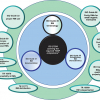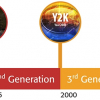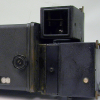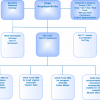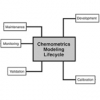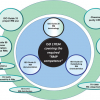Peter Jenks
the Jenks Partnership, Newhaven House, Junction Road, Alderbury, Salisbury, Wiltshire SP5 3AZ, UK
ISO Standard ISO 17025 is the cornerstone of the “Measured Once, Trusted Everywhere” concept and the accreditation of labs and testing establishment to ISO 17025 by accreditation bodies underpins the credibility. ISO 17025 is all about facilitating the free movement of goods and services and so helps to eliminate monopolies, cartels and all sorts of anti-competitive activities.
The European Union is supposed to be a vigorous champion of the “Free Market” and competition law is one of the pan-European areas of authority of the European Union. Competition law is supposed to regulate the abuse of market power by large companies, governments or other economic entities. There are four main policy areas and they can be summarised as:
Cartels: Groups of businesses or organisations that support anti-competitive practices designed to affect EU free trade. Articles 101 of the Treaty on the Functioning of the European Union (TFEU) detail the control of cartels.
Monopolies: Article 102 TFEU seeks to prevent the abuse of firms’ dominant market positions.
Mergers: Council Regulation 139/2004 EC (the Merger Regulation) gives the power to control proposed mergers, acquisitions and joint ventures involving companies which together have a certain, pre-defined amount of turnover in the EU/EEA.
State aid: Article 107 TFEU (ex Article 87) controls direct and indirect aid given by Member States of the European Union to companies.
Primary competence for applying EU competition law rests with the European Commission and its Directorate General for Competition, although state aids in some sectors, such as transport, are handled by other Directorates General.
For most EU labs and testing organisations, the cost of achieving and maintaining accreditation to ISO 17025 is significant. Unlike every other service or consumable purchased by a lab there is no choice of provider. This is because within the EU, and unlike in a number of other Countries, the “National Accreditation Service” is allowed to maintain a monopolistic position: indeed in some countries, for example Germany, where there were multiple accreditation bodies there has been a move to encourage mergers.
But why should the accreditation of a lab or testing facility be excluded from the normal competitive process? If the principles of free market competition must apply to the provision of proficiency testing services, supply of certified reference materials and all lab consumables, then why shouldn’t they apply to the provision of accreditation services?
All accreditation providers are themselves accredited: the ILAC MRA requires that that they must maintain conformance with the current version of ISO/IEC 17011, and related ILAC guidance documents. They are accredited by their peers, in that surveillance visits are undertaken by other accreditation bodies (tinyurl.com/67469n). But there is, within the analytical chemistry industry, understanding that all accreditation bodies are NOT the same. I was looking at two ISO 17025 schedules, one from UKAS (http://www.ukas.org/calibration/schedules/actual/0659Calibration%20Single_005.pdf) and one from DKD (http://www.dkd.eu/laboratorien/en/pdf/42701.pdf). The schedules cover much the same area, yet they are very different.
These two documents are interesting because of the differences between them. I’m not a physicist, but if I understand the German DKD schedule properly I’m confused! I do not see how they can have a constant measurement capability from 190 nm to 890 nm. The UKAS document is far more detailed showing measurement capability at a number of defined wavelengths.
Another example is the way the validity of the schedule if accreditation is evidenced: A2LA in the USA shows a clear start and end date, so if the lab is unable to satisfy the auditor the accreditation automatically ends on a set date (http://www.rt-corp.com/a2laLab.htm).
In the UK, UKAS doesn’t do this: there is a start date but no expiry date, as the UKAS schedule previously mentioned shows. The document was issued on 2 March 2007 and remains in force until withdrawn by UKAS.
This comparison of documents from the websites of three accreditation services shows that despite the intentions of ILAC, full harmonisation of accreditation services is far away, so surely labs should have freedom to chose the accreditation body that they believe will best meet their commercial needs? In Europe this is, mostly, not possible. In the USA there are a number of accreditation bodies all offering accreditation to ISO 17025, so labs can choose. One US company that I have long worked with, RT Corporation, selected A2LA as its accreditation provider because it was felt that this body was the most technically proficient and had the best technical assessors in the areas of interest to RTC. It certainly was not the cheapest provider.
The only opportunity in Europe for making a choice is if the national accreditation body doesn’t offer accreditation to a particular standard or if a multi-national organisation has the same procedure accredited in more than one EU country. In the latter case a company can select the accreditation body it prefers to undertake the accreditation at all its sites. A good example is Agilent Germany where UKAS has taken over accreditation from DKD (http://www.agilent.com/metrology/ukas-germany_schedule.shtml).
But why should choice be so restricted? I really believe that the provision of accreditation should be open, making it possible for all labs to choose. Such competition would be good for both the customers and the accreditation services. They would have to meet customer needs, or suffer the consequences.


